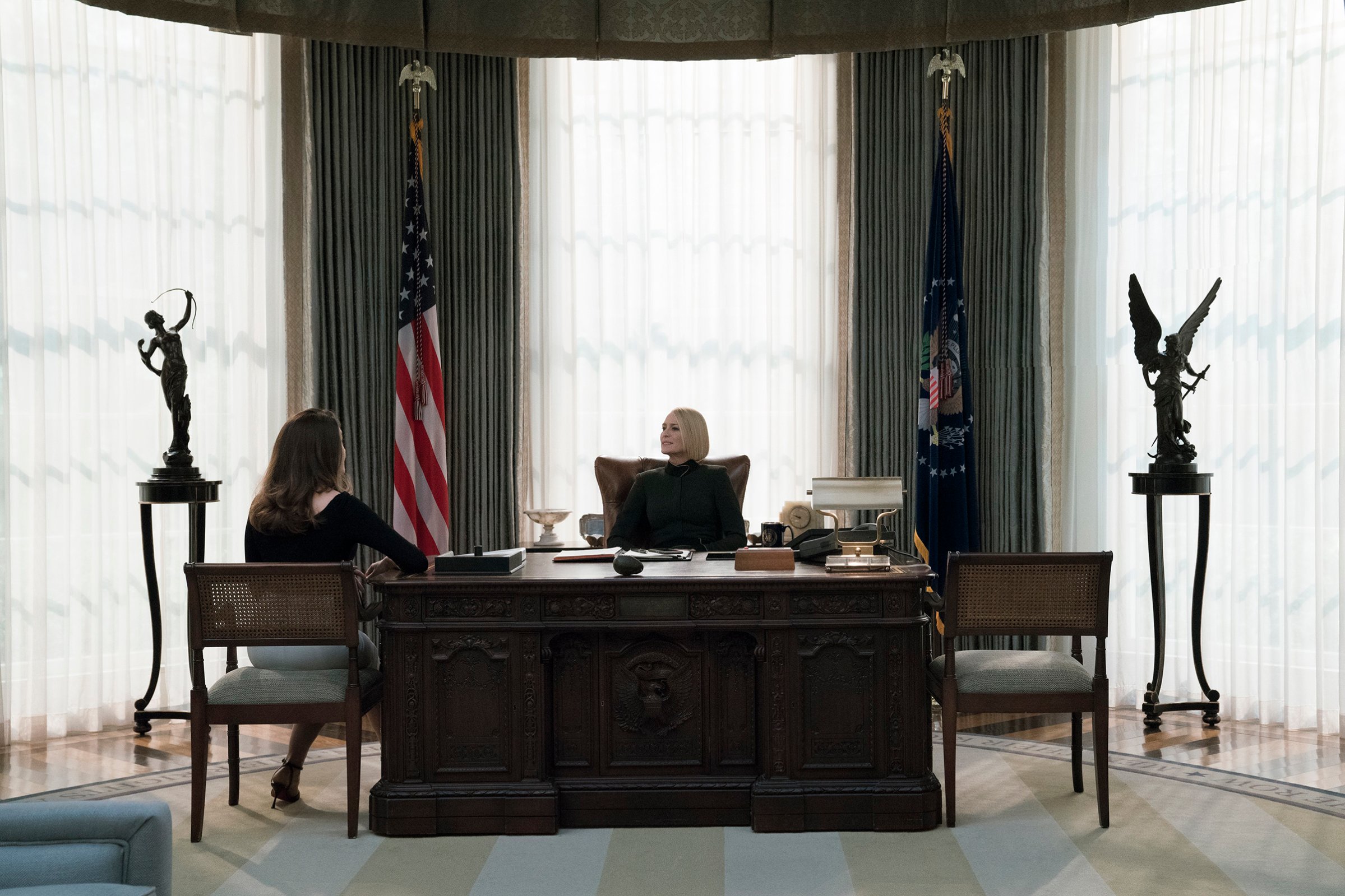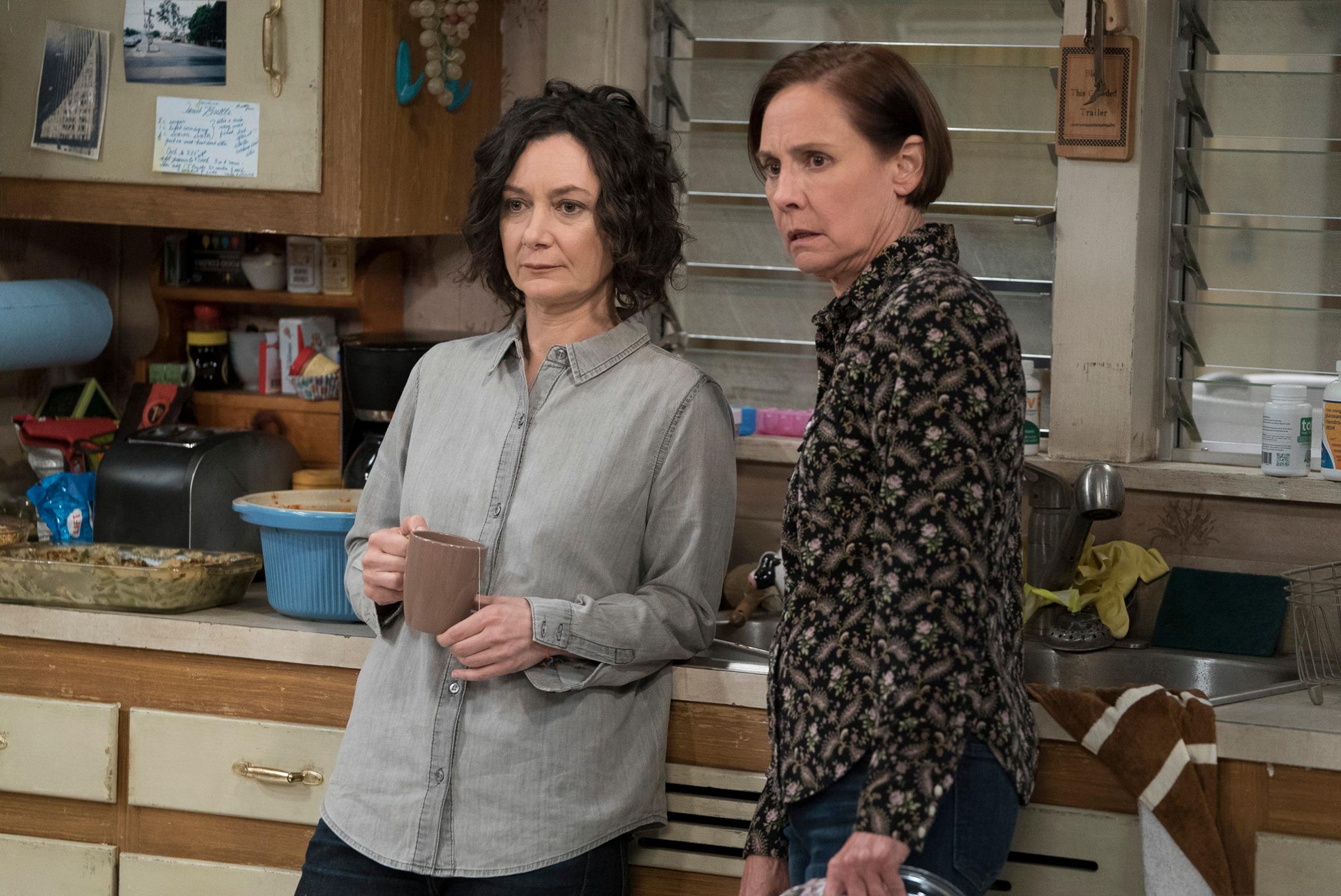
For a show that’s been unhinged for much of its run, Netflix’s House of Cards can be eerily prescient. The pre-Trump seasons followed ruthless Francis Underwood’s (Kevin Spacey) ascension to the presidency as he weathered many scandals that seemingly should have ruined him. Months before Spacey was revealed to be an alleged sexual predator during a paradigm-shifting public reckoning with the sexual misconduct of powerful men, the show had put Frank in the crosshairs. As impeachment loomed, he ceded the Oval to his wife Claire (Robin Wright), trusting that she’d pardon him. But the show’s fifth season closed with the newly empowered Claire ignoring Frank’s phone call, turning her steely gaze to the camera and proclaiming, “My turn.”
In its sixth and final season, arriving on Nov. 2, House of Cards makes the most of its foresight, chasing the political zeitgeist more openly than ever. The new episodes–which avoid showing even a still photo of Spacey–give Wright a story line that draws on the same sort of repressed female rage that has powered the #MeToo movement.
Set in the aftermath of Frank’s death, the season opens with Claire being briefed on the misogynistic threats and insults that have been hurled at her on the Internet. Soon enough, another speechifying white man, conservative businessman Bill Shepherd (Greg Kinnear), emerges to undermine her. One of Claire’s feminist declarations could be the season’s tag line: “The reign of the middle-aged white man is over.”
It feels like the show is washing its hands of Spacey’s alleged sins even as it jumps on the #MeToo bandwagon. Season 6 is threaded with flashbacks to Claire’s youth: A crowd of boys takes scissors to her dress. Her mother scolds her for hurting a boy who attacked her, insisting that she must have asked for it. Spacey may be the rare disgraced actor whose accusers are also male, but adopting story lines steeped in less specific Time’s Up rhetoric allows the show to symbolically distance itself from him and align itself with more righteous forces in Hollywood. It also, of course, keeps the show from getting canceled.
Cancellation isn’t just for TV shows anymore. In the past year, accusations of sexual misconduct have caused many stars to be “canceled”–that is, dismissed from public life by their employers, the social-media masses or both. House of Cards is just one of several shows that have persisted after such a purge. Transparent will film a final season without its lead, Jeffrey Tambor, who faced harassment accusations from co-workers. Netflix fired Danny Masterson from The Ranch following multiple rape allegations. Ed Westwick’s role in the BBC miniseries Ordeal by Innocence was recast before three sexual-assault charges against him were dropped.
But cancellation is a frustratingly inconsistent phenomenon; the threshold for cultural erasure varies widely. Extreme cases like those of Spacey and Harvey Weinstein, who’ve been accused of sexual violence by victims numbering in the double digits, get canceled quickly enough. Yet while Louis CK lost his FX deal following reports that he’d made women watch him masturbate, James Franco, who skipped this year’s Oscars after the Los Angeles Times ran accounts of his alleged “inappropriate or sexually exploitative behavior,” still stars in HBO’s The Deuce. While Franco sat out the publicity cycle for the current season, Mad Men creator Matthew Weiner didn’t do the same: though his career survived harassment allegations, he seemed blindsided by questions about them while promoting his new Amazon show, The Romanoffs.
Not every cancellation is a product of #MeToo, as Megyn Kelly recently learned, when her hour on NBC’s Today show was canceled after she questioned whether blackface Halloween costumes were racist. This past spring, Roseanne Barr (whose history of bigoted comments dates back years) got herself and her ABC sitcom canceled with a racist tweet. It clearly pained the network to ax a show that had premiered to some of the decade’s highest comedy ratings.
In its wake, last month ABC debuted a spin-off, The Conners, which finds the family coping with the opioid-related death of its matriarch. It’s the result of a wager that fans would still care about the show in the absence of its protagonist–and that they wouldn’t be put off by its association with a problematic star. In the case of The Conners, whose Oct. 16 premiere drew fewer viewers than Roseanne‘s did in March but more viewers than most network comedies now attract, the bet paid off.
Although House of Cards and The Conners both use abrupt, offscreen deaths to get rid of their canceled leads, those twists affect each show differently. The Underwoods’ story is a cartoonish Macbeth riff that kills off characters every season; Roseanne was a family sitcom that, while grounded enough to acknowledge that death touches all families, only occasionally addressed such dark themes. It’s unlikely anyone misses Frank besides his deranged aide Doug Stamper (Michael Kelly), but Roseanne Conner cemented her place as a TV icon and surrogate mom to a generation long before her creator went far right.
Faced with the dissonance between the real Roseanne Barr, her original character and Roseanne Conner 2.0, The Conners opts to mourn the version viewers loved best. More important, despite ABC’s odd choice to play Roseanne’s absence for suspense, the show depicts the aftermath of her death in a way that feels respectful of her history and true to the surviving characters. The story lines are poignant: Dan’s (John Goodman) decades-old anger problem flares up, and he struggles to fill Roseanne’s role as family sage. Darlene’s daughter Harris (Emma Kenney) regrets fighting with her grandmother. But the dialogue balances out the sadness with the Conners’ finely honed gallows humor. “Damn!” Becky exclaims after Dan storms off with a bottle of Roseanne’s painkillers that she found. “That’s the only thing from Mom’s closet I wanted.”

Considering the respective universes of these shows, it’s surprising that Frank’s death makes less narrative sense than Roseanne’s does. Yet the apparent ease with which Spacey’s evil tactician was bumped off doesn’t jibe with a story whose only consistent argument has been that in politics, the person with the least scruples always wins. And Frank’s soullessness explains why House of Cards fails to wring suspense out of the question of how he died. “I know,” says Claire, in the Season 6 premiere. “You want to know what really happened to him.” Do we, though? Frank had so many enemies and so few redeeming qualities that any revelation about his murder would elicit little more than a shrug.
Though the show wrote itself into a corner by plumbing the depths of the Underwoods’ depravity too early in its run—and has, in recent years, struggled to shock viewers inured to real political news wilder than the Underwoods’ scandals—the writing staff isn’t wholly to blame for the messiness of the new season. House of Cards had already gone into production when Spacey got canceled, presumably forcing the writers to preserve salvageable story lines while taking the plot in unintended directions—and fast. That haste is evident not only in the half-hearted central murder mystery but also in the sloppiness with which it’s shoehorned into scripts stuffed with Claire’s manipulation of Doug, Bill’s manipulation of the Vice President, a Russian collusion thread from Season 5, reporter Tom Hammerschmidt’s (Boris McGiver) endless quest to expose the Underwoods and more.
Claire’s reinvention as a feminist hero feels misguided too. It’s not that her support for women’s rights comes out of nowhere; in previous seasons she pushed for legislation to curb sexual assault in the military and went public with a personal abortion story (albeit one tweaked for maximum sympathy). Season 6 is, in part, an inquiry into her true nature, asking whether her progressive ends justify her Machiavellian means, and whether she has the capacity to become a good person now that Frank is gone. The problem is that the character is too compromised after five seasons of bad behavior to be redeemed by her politics.
There are shows that simply can’t work without their leads; though the first four seasons of Transparent were compelling, the departure of its trans parent seems bound to leave it unmoored. House of Cards has a different problem: based on a British miniseries, it had already exceeded its expiration date long before Netflix fired Spacey. Instead of pressing on to contradict its own core philosophy and push a feminist agenda that doesn’t fit, its producers might have done better to just cut their losses. A canceled star doesn’t have to mean a canceled show. But sometimes pulling the plug is the best way to protect its legacy.
More Must-Reads From TIME
- The 100 Most Influential People of 2024
- The Revolution of Yulia Navalnaya
- 6 Compliments That Land Every Time
- What's the Deal With the Bitcoin Halving?
- If You're Dating Right Now , You're Brave: Column
- The AI That Could Heal a Divided Internet
- Fallout Is a Brilliant Model for the Future of Video Game Adaptations
- Want Weekly Recs on What to Watch, Read, and More? Sign Up for Worth Your Time
Contact us at letters@time.com